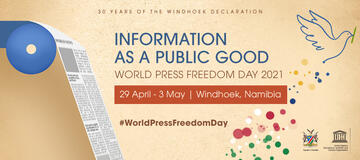
his year’s World Press Freedom Day theme “Information as a Public Good” serves as a call to affirm the importance of cherishing information as a public good, and exploring what can be done in the production, distribution and reception of content to strengthen journalism, and to advance transparency and empowerment while leaving no one behind. The theme is of urgent relevance to all countries across the world. It recognizes the changing communications system that is impacting on our health, our human rights, democracies and sustainable development.
To underline the importance of information within our online media environment, WPFD 2021 will highlight three key topics:
- Steps to ensure the economic viability of news media;
- Mechanisms for ensuring transparency of Internet companies;
- Enhanced Media and Information Literacy (MIL) capacities that enable people to recognize and value, as well as defend and demand, journalism as a vital part of information as a public good.
The event marks the 30th anniversary of the Windhoek Declaration, which is considered a benchmark for ensuring press freedom around the world. It all began at a seminar in Windhoek in 1991, but the ideas exchanged by African journalists and media professionals acted as a catalyst to encourage press freedom, independence and pluralism in Africa and in other parts of the world.
The conference includes panels about Covid 19 and its negative impact on media outlets, and about the future of African media, as well as about emergency measures to support media and to tackle online disinformation.
There will be the launch of several working papers, of UNESCO global study on good practices in tackling online violence against women journalists, and the discussions about Information as a public good, the future of public subsidy, the role of governments in protecting media freedom.
On 29 April, there will be the kick off of the 6th edition of the Academic Conference on the Safety of Journalists, hosted by University of Namibia, and in partnership with the UNESCO Chair on Media Freedom, Journalism Safety and the Issue of Impunity at Sheffield University, Oslo Met University and the Journalism Safety Research Network.
For the challenges ahead, perspectives will be given by the High Level Panel of Legal Experts on Media Freedom.
The full programme and the registration form are available here .
Tags: Research
This content is part of the Media Freedom Rapid Response (MFRR), a Europe-wide mechanism which tracks, monitors and responds to violations of press and media freedom in EU Member States and Candidate Countries. The project is co-funded by the European Commission.


